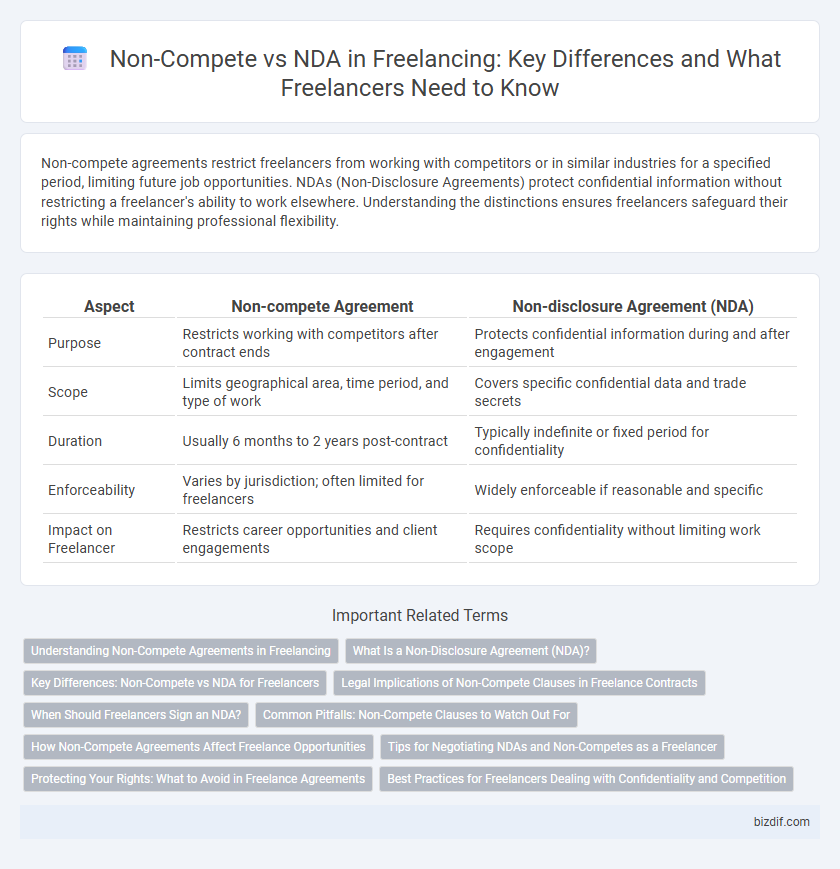Non-compete agreements restrict freelancers from working with competitors or in similar industries for a specified period, limiting future job opportunities. NDAs (Non-Disclosure Agreements) protect confidential information without restricting a freelancer's ability to work elsewhere. Understanding the distinctions ensures freelancers safeguard their rights while maintaining professional flexibility.
Table of Comparison
| Aspect | Non-compete Agreement | Non-disclosure Agreement (NDA) |
|---|---|---|
| Purpose | Restricts working with competitors after contract ends | Protects confidential information during and after engagement |
| Scope | Limits geographical area, time period, and type of work | Covers specific confidential data and trade secrets |
| Duration | Usually 6 months to 2 years post-contract | Typically indefinite or fixed period for confidentiality |
| Enforceability | Varies by jurisdiction; often limited for freelancers | Widely enforceable if reasonable and specific |
| Impact on Freelancer | Restricts career opportunities and client engagements | Requires confidentiality without limiting work scope |
Understanding Non-Compete Agreements in Freelancing
Non-compete agreements in freelancing restrict professionals from working with competitors or starting similar businesses within a specific geographic area and time frame after contract termination. These clauses aim to protect clients' proprietary information, trade secrets, and market position while balancing the freelancer's right to work. Understanding the legal scope and enforceability of non-compete clauses is crucial, as overly broad or indefinite restrictions may be deemed invalid in many jurisdictions, impacting a freelancer's career flexibility.
What Is a Non-Disclosure Agreement (NDA)?
A Non-Disclosure Agreement (NDA) is a legally binding contract that protects confidential information shared between freelancers and clients from being disclosed to unauthorized parties. It ensures sensitive business details, trade secrets, or project specifics remain private during and after the freelance engagement. NDAs are essential for maintaining trust and safeguarding intellectual property in freelancing relationships.
Key Differences: Non-Compete vs NDA for Freelancers
Non-compete agreements restrict freelancers from working with competing clients or industries for a specified period, limiting their ability to offer similar services and potentially affecting future job opportunities. NDAs (Non-Disclosure Agreements) focus solely on protecting confidential information by legally binding freelancers to confidentiality, without restricting their ability to work in the same field. Understanding the key differences ensures freelancers maintain professional freedom while safeguarding client information.
Legal Implications of Non-Compete Clauses in Freelance Contracts
Non-compete clauses in freelance contracts restrict a freelancer's ability to work with competitors or within certain markets for a specified duration and geographic scope, potentially limiting future business opportunities. Unlike NDAs, which protect confidential information without restricting employment, non-competes can face legal challenges due to their impact on career mobility and are often subject to jurisdictional limitations. Freelancers should carefully evaluate the enforceability and scope of non-compete clauses to avoid unintended legal obligations and ensure fair contract terms.
When Should Freelancers Sign an NDA?
Freelancers should sign a Non-Disclosure Agreement (NDA) when handling sensitive client information, proprietary data, or trade secrets to ensure confidentiality and protect intellectual property. NDAs are crucial during projects involving product development, marketing strategies, or access to private databases where unauthorized disclosure could result in legal consequences. Signing an NDA provides a clear legal framework that defines what information must remain confidential and establishes trust between the freelancer and the client.
Common Pitfalls: Non-Compete Clauses to Watch Out For
Non-compete clauses in freelancing contracts often impose overly broad restrictions on geographic scope and duration, limiting future work opportunities unfairly. Freelancers should watch out for vague terms that might unintentionally prevent them from working with clients in related industries or regions. Carefully negotiating these clauses ensures the freedom to pursue diverse projects while protecting client confidentiality and interests.
How Non-Compete Agreements Affect Freelance Opportunities
Non-compete agreements limit freelancers from working with competitors or within specific industries for a set period, significantly restricting their ability to secure diverse projects and expand their client base. These contracts can reduce flexibility, hindering income growth and professional development by confining freelancers to narrow market segments. Unlike NDAs, which protect confidential information without restricting future work, non-competes impose legal boundaries that often challenge freelancers seeking broad-ranging opportunities.
Tips for Negotiating NDAs and Non-Competes as a Freelancer
Freelancers should carefully review the scope and duration of NDAs and non-compete agreements to ensure they do not unduly restrict future opportunities or client acquisitions. Negotiating limits on geographic reach and timeframes can preserve flexibility while protecting sensitive information. Clearly defining what constitutes confidential information and seeking mutual benefit clauses can help balance protection with professional freedom.
Protecting Your Rights: What to Avoid in Freelance Agreements
Freelancers should carefully distinguish between non-compete clauses and non-disclosure agreements (NDAs) to protect their professional rights effectively. Non-compete agreements restrict freelancers from engaging with competing clients or industries for a set period, limiting earning opportunities, whereas NDAs primarily safeguard confidential information without impeding future work. Avoid accepting overly broad or indefinite non-compete terms in freelance contracts to maintain career flexibility and ensure clear confidentiality obligations protect your intellectual property without unnecessary restrictions.
Best Practices for Freelancers Dealing with Confidentiality and Competition
Freelancers should carefully evaluate non-compete agreements and NDAs to protect their rights while respecting client confidentiality and market competition. Prioritizing clear contract terms that define the scope, duration, and geographic limits of non-competes ensures fair protection without unduly restricting future opportunities. Using NDAs that specifically outline confidential information and obligations helps maintain trust and safeguards sensitive data critical to successful freelance collaborations.
Non-compete vs NDA Infographic

 bizdif.com
bizdif.com